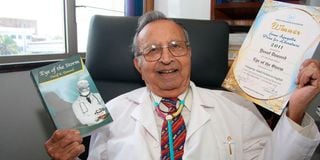Yusuf Dawood’s pen, scalpel inspired generations

Dr Yusuf Kodwavwala Dawood displays his book "Eye of the Storm" during a past interview with Sunday Nation.
Growing up as a teenager in the late 1990s, the “Surgeon’s Diary” column by Yusuf Dawood is one that I found easy and interesting to read, thanks to the writer’s use of simple language. His articles, alongside “Whispers” by the late Wahome Mutahi, were exciting and tickling even to children.
The news of Dr Dawood’s death on Saturday was saddening. It is a big blow to his readers, fans and Nation family. In the recent past, Dr Dawood had been writing about his life, taking his readers down memory lane—for instance, “How ‘Surgeon’s Diary’ started at Rotary weekly lunch meeting” (Sunday Nation, July 5, 2020).
In another interesting article, the surgeon narrated his experience when he and his wife, Marie, “stepped on African soil for first time” in 1961, when Kenya was still a British colony with a population of just seven million (SN, November 24, 2019). And in what signalled the end of his column, he boldly asked his readers: “After 939 articles, in 38 years, is it time for this article to end?” (SN, September 16, 2018.
Surgery skills
Dr Dawood will be remembered for a number of things. Besides using his pen to sneak readers into his operating theatre, he took advantage of his great sense of humour to entertain his audience.
For instance, acknowledging some of his teachers in “Gratitude to the gurus who shaped my surgery skills” (SN, November 12, 2016), he talks of a Mr Saraiyya, a chain smoker of British-made cigarettes. Then, India had boycotted British goods as a way of fighting for independence from Britain. But every time Saraiyya lit up, his excuse was “Burning British goods!”
By successfully managing his “four wives”—surgery, rotary, writing and Marie—Dr Dawood set a good example, that success follows those who are persistent and focused no matter the number of engagements.
For sure, he leaves indelible imprints on those who looked up to him for mentorship, especially on medicine and literature. We will miss him.
As the Kalenjin would say, rute ne tala bomori (good bye, Grandfather).
Mr Chumo is a high school teacher. [email protected].





